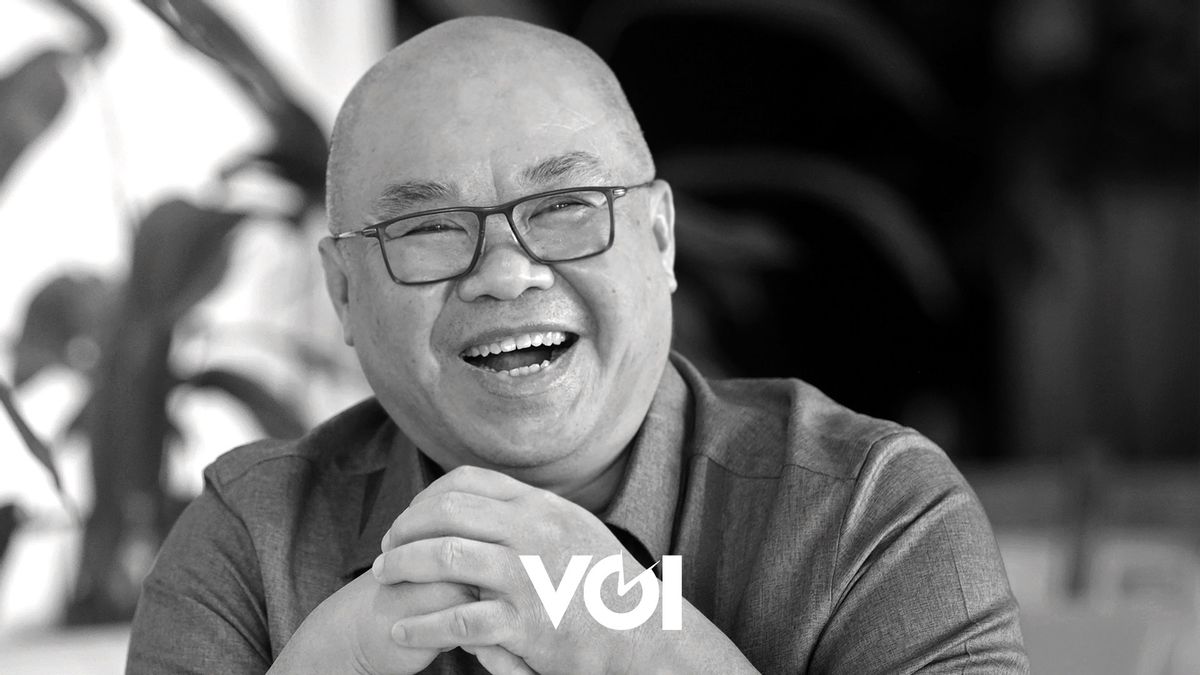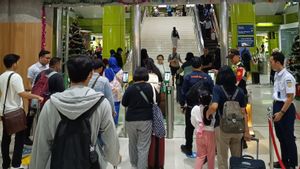In fact, shopping centers are basically offline or offline. This is in contrast to the market place which is essentially online. Therefore, said Alphonzus Widjaja, General Chairperson of APPBI (Indonesian Shopping Center Management Association), his party is not worried about competition between shopping centers and market places, because the two markets are different. The shopping center must be a social connection hub, aka the center of social interaction for the community.
***
Alphonzus is not at all afraid of the rampant market place in recent years. For him, shopping centers do not compete head to head with market places. “Malls or shopping centers have offline DNA. If the market place is indeed the DNA online. There are so many things that can't be sold online. If you force it, the essence will be lost. This is the selling point that must be optimized by the shopping center manager," he said.
Along with the development and growth of today's society. They need a place to hang out offline. Especially after being restricted for so long due to the COVID-19 pandemic. The need to meet, interact with each other increases. Shopping centers can be the right place to interact while eating, drinking and enjoying entertainment.
In foreign countries, such as in Singapore, Hong Kong, Taiwan, Japan, Malaysia, and others, shopping centers are developing in that direction. In one place there are shopping centers, offices, residences (apartments), even hotels and MRT stations or other public transportation. All will pass through the shopping center before heading to the office, residence or other place. The shopping center must really function as a gathering place.
“Shopping centers must become social connection hubs. A place where people gather, interact and do things collectively. After they gather at the shopping center, then they eat, drink, and see there are good things then shop. Things like that can't be replaced, so you have to go offline," he said.
If the manager of a shopping center only functions as a place for shopping, there is no other interesting thing, it will lose badly when dealing with a market place. "Each one has advantages, and how can we optimize those advantages and make them attractive to the community," said Alphonzus Widjaja to Iqbal Irsyad, Edy Suherli, Savic Rabos and Rifai who visited him at the Kota Kasablanca shopping center, South Jakarta, recently. He talked about how shopping centers have to struggle with the rigors of the COVID-19 pandemic, how they rack their brains so that the various problems that accompany them can be addressed one by one. Here is an excerpt of the full conversation.

Almost all lines are affected by the COVID-19 pandemic, what about APPBI members? What difficulties do you feel the most?
First, of course, is reduced income. The tenants are unable to pay the rent, resulting in a drop in income from the shopping center. Even so, shopping centers must continue to pay fees even though the shopping center is closed for three months in April, May and June 2020. The costs to be paid are like electricity and gas. Then taxes and levies, such as PBB, advertisement tax still have to be paid in full. Employee salaries are also paid. This is what burdens our members during the pandemic.
What to do with this condition?
Shopping centers perform efficiency, a maximum of 30 percent. Because there are factors that cannot be reduced: security, safety and health. Efficiency can not be done on these three things. The safety of elevators, escalators must be maintained. After efficiency is carried out the reduction of employees with steps. First, he was laid off, in the past there were three stages related to this work, the first stage was at home with full wages paid, the second was laid off with wages paid in part, and lastly, layoffs were carried out.
We've gone through all of that and the hardest one is in 2021. The problem is that in 2020, even though shopping centers are closed for 3 months, they still have reserves, so they can still survive. But this reserve fund has been depleted to be used to survive in 2020. Well, once you enter 2021, the shopping center will no longer have any reserves. We enter 2021 the conditions are much tougher, in June and July there is a Delta variant.
Are shopping centers closed?
Small and medium-sized shopping centers facing this condition are no longer strong, and eventually they are closed or sold. Pakuwon Group took over Hartono Mall in Yogyakarta and Solo. But indeed the performance and performance of shopping centers before the pandemic also greatly affected. So, if these shopping centers performed before the pandemic, the performance was not optimal when they entered the pandemic period, the situation was even more severe.
I classify the shopping center into three classes; top, middle and bottom. The upper class is only 5 percent of all shopping centers, those are the malls in Sudirman and Thamrin. Such as Plaza Indonesia, Plaza Senayan, Pacific Place, and Senayan City Jakarta. Then the middle class as much as 35 percent. And the largest is the lower class as much as 60 percent. The most affected are the middle and lower classes. Because the customers are employees and employees who are also affected. The upper-level customers are self-employed customers, whose relatively income is still far more stable than the lower middle class. All classes are affected by different situations.

Now that the situation is more conducive, how to respond to this?
We have to express our appreciation to the government for being good at handling this pandemic, even though at first it was stuttering. At that time health was prioritized, the economy came second. Now the condition is starting to balance. Now it's time for us to get out of economic difficulties. This balance was obtained because the government was one of them successfully vaccinated. We have to keep pushing. Vaccination is key. Even the shopping center supports and becomes a vaccination center and supports the care-protect protocol. Although initially opposed, eventually pushed the acceleration of vaccination.
Now there is an assumption that malls that apply protective care and strict health protocols actually make people believe, because they are considered healthy. On the other hand, if there are malls that don't pay attention to this factor, the public is afraid. This is a positive thing and makes the level of visits to shopping centers continue to rise. In 2020 it will decrease by only 50 percent, in 2021 it will increase to 60 percent and in 2022 it is predicted to increase by 70 to 80 percent. The situation is more conducive, the estimated period of Ramadan and Eid will improve until the second half of the second quarter of 2022.
When people visit shopping centers, what are the most sought after; basic necessities, fashion, culinary, entertainment, music, cinema, and what else?
At the start of the 2020/2021 pandemic, the most sought after were only basic needs and health needs. In the supermarket, this restaurant is the only thing you are looking for, so the need for health is health and basic needs and then household needs because many people are at home. They do a lot of house renovations in addition to basic needs. The most affected are clothing, and other secondary needs.
During this pandemic, do APPBI members provide relief to tenants in paying rent, for example? So that the tenants in the mall can survive?
We provide assistance with various rental fee waivers. But the policy cannot be the same between one shopping center and another, between one tenant and another. The types sold are also different, some are affected and some are not like the health sector. These factors are used to provide convenience. What is clear is that the association provides assistance even though the form is not the same. We hope that all shopping centers will continue to operate. But how do we operate safely and healthily in the midst of the current situation. We also ask the government to provide relaxation, wage subsidy and incentives. The government granted our request, although not all of them were due to budget constraints.
What else is APPBI doing in this pandemic situation?
We exchange insights and knowledge with other shopping center associations from abroad, such as with mall associations in Hong Kong, Taiwan and China. Especially China, they rebounded first. Their experiences are passed on to us.
Do market places and online shops that are booming lately affect people to shop at malls, how much influence, especially in the last two years?
Actually, since before the online shop pandemic, market places have been considered a disruption to shopping centers. After the pandemic, the penetration of online sales is getting more massive. But is this really a threat to shopping malls? I don't think so. Why? because not all products can be online. The easiest food to eat. For food, find dinning cannot be online. We have to sit down and be served so we can feel it. Gathering with friends and colleagues cannot be obtained if you are not present.
If the function of a shopping center is only as a place to shop, an online shop will definitely be a threat. Therefore avoid it. Actually, the DNA of shopping centers is offline. If the marketplace is DNA, it's online. That's why shopping centers don't go online. Features in a shopping center must be digital, but digital does not mean it becomes an online shop. The digital example is parking, paying for parking is digital. The promotions and publications are digital, but they don't participate in online sales.
So its offline function should be strengthened?
Yes, shopping centers should strengthen that offline function. Humans are social creatures, shopping centers can be social connection hubs. We need to interact with each other directly, not virtually. Now everything is virtual, starting from meetings, birthdays, marriages, funerals and others. People are tired of it all. So basically humans are social creatures that must be caught by shopping centers. The shopping center must be able to prepare and provide other functions besides the shopping function.
Malls can be a place to meet, gather and other activities. This function should prioritize the shopping function as the second function. If you reverse it, you will be dealing with a market place. Overseas, Hong Kong, Tokyo, and others such functions. Shopping centers are not just places to shop. From the MRT station to the office through the mall, from the apartment to the MRT via the mall. So the function of the shopping center there is not just a place for shopping but has become a connection hub. In Jakarta, it's only in Blok M Plaza.
If the function of a shopping center is as a social connection hub, then the market place is not a competitor. Our people like to gather, eat and so on. This function must be highlighted in order to be a winner.
During the Pandemic, said Alphonzus Widjaja, don't reduce your activities

It's okay to limit our movement space when the COVID-19 pandemic reaches its peak or when we have to self-isolate. However, said Alphonzus Widjaja, General Chairperson of the Indonesian Shopping Center Entrepreneurs Association (APPBI), activity should not be reduced. Still exercising, virtual meetings and so on. After the situation is getting better now, everything must be further improved.
"Actually, during this pandemic, I have more activities. Before the pandemic, meetings had to meet, sometimes matching the time was not easy. Now through technology, meetings can be held at any time, anytime and anywhere," said the man who was born in Sukabumi, West Java, August 18, 1965.
To compensate for the activity that remains high, Alphonzus does sports that can increase the elasticity and fitness of the body. “Exercise is very important to do, if I do the sport swimming. It feels like something is missing if you don't move your body's muscles,” he continued.
It's just that during the COVID-19 pandemic he had a bit of trouble finding a public swimming pool that was already open. “Fortunately, although it is not as big as a public swimming pool which is usually the size of an Olympic standard, I have a swimming pool at home. Yes, it's good for exercising. Now one or two there are swimming pools operating for the public with strict health protocol requirements," said CEO of Retail & Hospitality Division at (Jakarta) SINAR MAS LAND (Real Estate Developer).
In addition, Alphonz also complements his body's defenses with nutritious food intake and multivitamins that can increase the body's immune system. He believes that prevention is better than cure. Food intake and multivitamins that the body needs will be useful in maintaining and increasing the body's immune system.
One more thing that needs to be taken care of well during the pandemic before the pandemic, said Alphonz, is to keep the mind relaxed and free from stress. "Thoughts have the greatest impact. He will affect the physical condition that was originally fine turned into a drop. So that mind must be guarded, think positively as much as possible and throw away negative thoughts that will harm the body," continued the man who finished his study at the Faculty of Civil Engineering, Pancasila University, Jakarta.
Opportunity

Alphonz is well aware that the pandemic that has hit the world in the past two years has brought many changes in all aspects of life. "And this change is an opportunity," he said optimistically.
The question, he continued, is that this opportunity will be nothing if it is not utilized and maximized. "There must be innovation with creativity and so on, so that these opportunities can turn into profits," he said.
The same is true for the shopping center sector. "We have to fight hard to get through this pandemic that doesn't know when it will end. But what makes us excited day by day the situation is getting better. The restrictions are slowly loosening. Visits to malls are starting to recover even though they haven't returned to the way they were before the pandemic, but the progress continues to increase," he said.
When he travels to foreign countries, especially countries with developed shopping centers such as Singapore, Hong Kong, China, Korea, Japan, etc., he learns a lot. "It's not necessarily what we find abroad that we can apply in Indonesia. There are things that are universal that can be applied with modifications here and there according to the conditions of our country,” he explained.
“How do shopping centers in the countries I visit display their products in a unique and interesting way. How to decorate and design the characters. For certain brands that are selling well in a country, we can offer them to open branches in Indonesia and so on," said Alphonz.
Holiday

Alphonz is grateful to be able to work in a shopping center. Even though he worked almost non-stop for a week, basically every day was like a continuous vacation. How come?
“I tell you how good it is to work in a shopping center. Every day is like a vacation. Even when I visit the area, what I visit is definitely a shopping center in the city that is my goal," he said.
That's why he often invites his family when he has an assignment out of town, either for the office where he works now, or from a professional organization; APPBI where he is at the helm. “I usually take my wife and children when I have an assignment out of town. We meet at the shopping center. When they come with their wives, they can enjoy the facilities in the shopping center while I carry out tasks or meetings at the same place even though in different locations. So that's one of the advantages of working in a shopping center, every day is a holiday, hehehe," said Alphonz with a laugh.
He conveyed a message to the public not to hesitate to visit shopping centers. The problem is that all shopping centers under APPBI have implemented health protocols. “In the early days of the pandemic, people were afraid to come to shopping centers or malls. Now there are no more excuses, because malls have implemented strict health protocols. There are three factors that are non-negotiable and they are applied in shopping centers; security, safety and health,” concluded Alphonzus Widjaja.
"Actually, since before the online shop pandemic, market places have been considered a disruption for shopping centers. After the pandemic, the penetration of online sales is getting more massive. But is this really a threat to shopping malls? I don't think so. Why? because not all products can be online,"
The English, Chinese, Japanese, Arabic, and French versions are automatically generated by the AI. So there may still be inaccuracies in translating, please always see Indonesian as our main language. (system supported by DigitalSiber.id)








